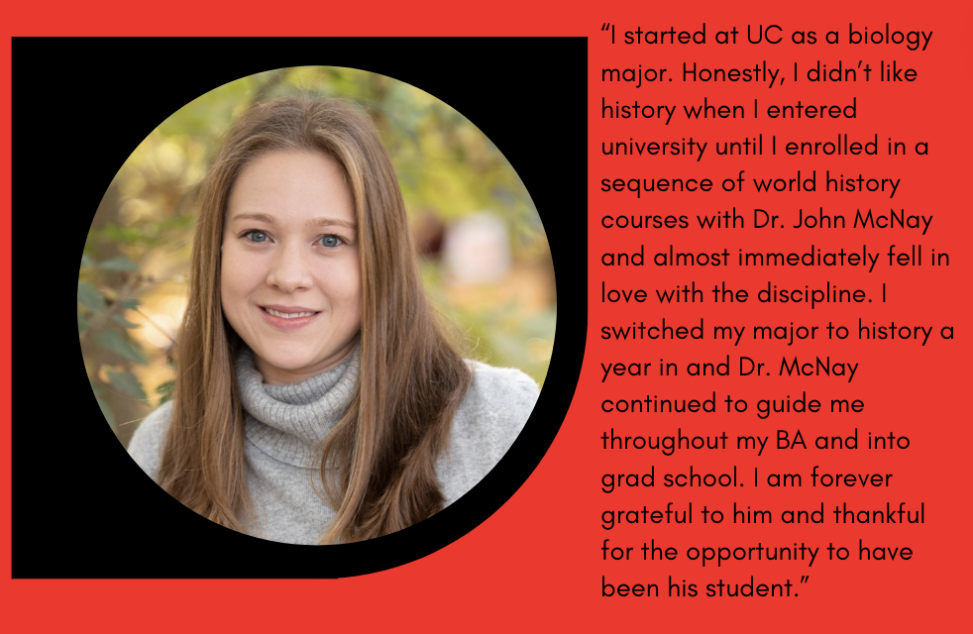I am originally from Cincinnati and graduated from UC in 2017 with a BA in history and a minor in sociology. As an undergrad, I won the history department’s Emma Louise Parry Prize for demonstrating outstanding abilities in my field of history (medical humanities) and for the undergraduate thesis research I conducted. I was also a member of Phi Theta Kappa, the National History Honor Society. After graduation, I moved to Germany for two years where I became interested in foreign language acquisition and teaching. I then moved to Japan where I taught high school EFL courses for a few years. Now I am back in the US and working on my MA.
What are you up to these days?
I am currently in the final semester of my MA at Miami University in Oxford, Ohio. I am obtaining both an MA in history and a graduate certificate in women’s, gender, & sexuality studies. I also teach introductory-level history courses as a Graduate Teaching Assistant, which is one of the best parts of my current program. I will be applying for PhD programs later this year and can’t wait to get started! I hope to continue teaching at the university level throughout my career and to continue researching the social history of medicine and law.
What brought you to history at UC?
I started at UC as a biology major. Honestly, I didn’t like history when I entered university until I enrolled in a sequence of world history courses with Dr. John McNay and almost immediately fell in love with the discipline. I switched my major to history a year in and Dr. McNay continued to guide me throughout my BA and into grad school. I am forever grateful to him and thankful for the opportunity to have been his student.
What did you focus on as a history student at UC?
I took a huge variety of history courses at UC, but overall, I gravitated toward social history and histories from below. This easily led to my final undergraduate focus on how social and cultural biases impact our ability to effectively treat illness and disease.
Did you have any favorite history courses? Which ones and why?
Dr. John McNay’s world history courses ignited my interest in history. I took Thoughts and Methods and Renaissance Europe with Dr. Longfield Karr. Both courses developed my understanding of historiography and methodology, and they significantly developed my research writing abilities. She was a great professor and always put a lot of time and energy into helping her students improve. Likewise, I really enjoyed Dr. Stephen Porter’s Human Rights and US Foreign Policy course which continued to develop my ability to critically engage with the work of other historians and primary sources. Finally, my capstone course with Dr. Elizabeth Frierson, WWI and the Medical Humanities inspired me to pursue my current area of study in the medical humanities.
What did you focus on for your capstone?
My undergraduate thesis, Lessons in History: The Significance of Social Influence on WWI Psychiatry, utilized an interdisciplinary analysis of historical documentation combined with the application of sociological thought. This method offered me the unique opportunity to view how gendered and culturally biased medical discourse during WWI hindered progress and innovation in the field of neuropsychiatry and psychology and the harm this caused soldiers suffering from psychological trauma during the war. This was accomplished through comparative research examining medical policy, practices, and treatments for war neuroses in several of the belligerent nations involved in WWI, including France, Germany, the Ottoman Empire, the United Kingdom, and the United States.
What skills did you pick up from studying history that have served you well beyond your courses?
The skills I learned from studying history are innumerable. Of course, first and foremost it teaches critical thinking, curiosity, challenging authority, and collaborative work. Historians love to critically engage with one another and build on the work of historians that have come before them. Of course, it also taught me writing skills, crafting a clear concise argument, and, most importantly, for me, I learned self-advocacy. I learned to seek out opportunities that would advance my research and academic goals. For example, I applied to and received a Taft Undergraduate Enrichment Award from the Taft Research Center which provided me with the opportunity to conduct research at the University of Oxford’s Bodleian Library. —So, apply, apply, apply!!!
Have any advice for current students?
Have the absolute audacity, be bold, and walk into spaces where you feel like you don’t belong. I started university as a non-traditional, first-generation university student and it was trying. I felt out of place all the time. I know that non-traditional students make up an increasingly significant portion of the university demographic and, going in, know that the work you do matters, your perspective matters, and don’t let the obstacles you encounter discourage you. Keep problem-solving!
